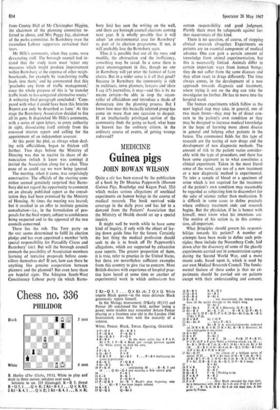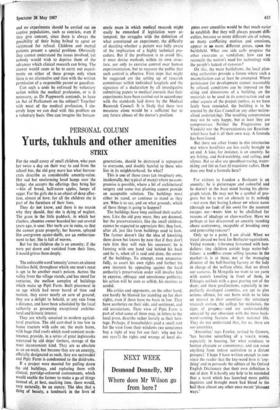Guinea pigs
MEDICINE JOHN ROWAN WILSON
Quite a stir has been caused by the publication of a book by Dr Maurice Pappworth (Human Guinea Pigs, Routledge and Kegan Paul, 32s) which makes serious allegations of unethical experiments on human beings in the course of medical research. The book received wide coverage in the daily press and has led to a demand from the Patients' Association that the Ministry of Health should set up a special inquiry.
It might well be worth while to have some kind of inquiry, if only with the object of lay- ing down guide lines for the future. Certainly the last thing the medical profession should seek to do is to brush off Dr Pappworth's allegations, which are supported by exhaustive case reports. The greater proportion of them, it is true, refer to practice in the United States, but there are nevertheless sufficient examples from this country to give rise to concern. Most British doctors with experience of hospital prac- tice have heard at some time or another of experimental work in which enthusiasm has unpins Black queen—in the main defences Black generously repins himself.
outrun responsibility and good judgment. Plainly there must be safeguards against fur- ther occurrences of this kind.
There is no question, of course, of stopping clinical research altogether. Experiments on patients are an essential component of medical advance. One can gain a certain amount of knowledge from animal experimentation, but this is necessarily limited. Animals differ in certain important ways from human beings; they do not suffer from the same diseases and they often react to drugs differently. The time always comes, in the development of a new approach towards diagnosis and treatment, where trying it out on the dog can take the investigator no further. He has to move into the hospital ward.
The human experiments which follow as the next logical step may take,'in general, one of- two main forms—they may be of direct con- cern to the patient's own condition or they may be designed to increase medical knowledge in the hope of learning more about disease in general and helping other patients in the future. The commonest fields for this type of research are the testing of new drugs and the development of new diagnostic methods. The amount of risk to the patient varies consider- ably with the type of procedure, and there has been some argument as to what constitutes a clinical experiment. Taken in the most literal sense of the word, any use of a new treatment or a new diagnostic method is experimental. To take a sample of blood or a specimen of urine which is not required for the treatment of the patient's own condition may reasonably be regarded as subjecting him to discomfort for the sake of science rather than medication. It is difficult in some cases to define precisely where ordinary treatment ends and research begins. But the physician, if he is honest with himself, must know what his intentions are. The motive of his action is, in this connec- tion, all-important.
What Ninciples should govern his responsi- bilities towards his patient? A number of attempts have been made to define such prin- ciples; these include the Nuremberg Code, laid down after the discovery of some of the ghastly experiments carried out in concentration camps during the Second World War, and a more recent code, based upon it, which is used by our own Medical Research Council. The funda- mental feature of these codes is that no ex- periments should be carried out on patients except with their understanding and consent; and no experiments should be carried out on captive populations, such as convicts, even if they give consent, since there is always the possibility of their being bribed to agree or victimised for refusal. Children and mental patients present a special problem. Obviotisly they cannot understand the issues involved, yet nobody would wish to deprive them of the advances which clinical research can bring. The answer would seem to be to carry out experi- ments on either of these groups only when there is no alternative and then with the written permission of a responsible parent or guardian.
Can such a code be enforced by voluntary action within the medical profession, or is it necessary, as Dr Pappworth contends, to have an Act of Parliament on the subject? Together with most of the medical profession, I sin- cerely hope we can deal with this problem on a voluntary basis. One can imagine the bureau- cratic maze in which medical research might easily be enmeshed if legislation were at- tempted; the struggles with the definition of what constituted an experiment, the difficulty of deciding whether a patient was fully aware of the implication of a highly technical pro- cedure. But if the profession is to avoid this, it must devise methods within its own struc- ture, not only to exercise control over human experimentation, but to reassure the public that such control is effective. First steps that might be suggested are the setting up of research committees within individual hospitals and the signature of a declaration by all investigatOrs submitting papers to medical journals that their experiments have been carried out in accordance with the standards laid down by the Medical Research Council. It is likely that these two measures alone would be a sufficient bar to any future abuses of the doctor's position.



































 Previous page
Previous page